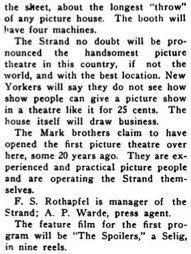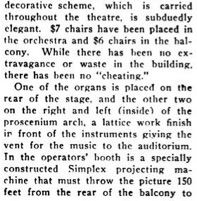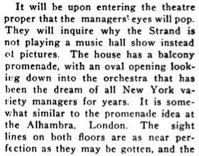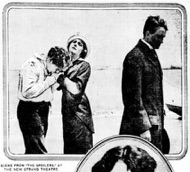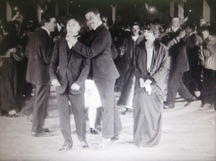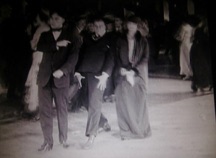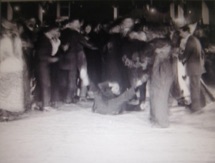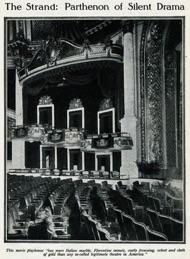Tango Tangles Clippings 15/27
Variety, New York, April 10, 1914.
Tango Tangles Scenes
& S. L. Rothapfel, undated
& Scene from The Spoilers at the New Strand Theatre
(...) New York Tribune, April 12, 1914
& The Strand: Parthenon of Silent Drama
This movie playhouse „has more
Italian marble, Florentine mosaic, costly frescoing,
velvet and cloth of gold than any
so-called legitimate theatre in America.“
(...) Photoplay, April 1915
„The house itself will draw business“
Editorial content. „Handsome Picture House
Is New York‘s Strand
Due to Open Tomorrow (Saturday) Night.
Represents Nearly $1,000,000. Seats 3,300 on Two Floors
and Compares Favorably With Any Metropolitan
Theatre. Three Organs and Orchestra of 30 Installed.
Prices 25 Cents Top. Straight Pictures, With
Music, the Policy.
New Yorkers will have a more clearly defined idea
of what moving pictures mean and where they
are going to after viewing the new Strand theatre at Broadway
and 48th street, opening tomorrow (Saturday) night.
It will seat 3,300 people on the two floors, and compares
favorably with any theatre in the metropolis. Prices
are to be 25 cents for any seat in the orchestra, with box
seats 50 cents. Three organs have been installed
and an orchestra of 30 pieces placed in the pit.
The Strand represents an investment of nearly
$1,000,000. It was promoted and financed by the
Mitchell Mark Realty Co., the three principal stock-holders
being Mitchell and Moe Mark and Max Spiegel.
The theatre stands on leased ground. It covers nearly the
entire block fronting on Broadway. Other than a loan
of $400,000 made by the Satton Estate (which owns the
land) the building was seen through to completion
by the Mark people.
Thomas W. Lamb, the architect for the Strand, will
have some of the New York theatre managers who believe
they know the last word in theatre construction
opening their eyes at this house. Its lobby entrance
from Broadway is 40 feet wide by 70 deep, with
three ticket selling booths, The stage could hold any production
and the theatre has been built with accommodations for
any change of policy ever made. Thirty-two flaming arcs will
run around the front of the Strand.
It will be upon entering the theatre proper that the
managers‘ eyes will pop. They will inquire why the Strand
is not playing a music hall show instead of pictures.
The house has a balcony promenade, with an oval opening
looking down into the orchestra that has been the dream
of all New York variety managers for years. It is
somewhat similar to the promenade idea at the Alhambra,
London. The sight lines on both floors are as near
perfection as they may be gotten, and the decorative scheme,
which is carried throughout the theatre, is subduedly
elegant. $7 chairs have been placed in the orchestra and $6 chairs
in the balcony. While there has been no extravagance or
waste in the building, there has been no ,cheating.‘
One of the organs is placed on the rear of the stage,
and the other two on the right and left (inside) of the
proscenium arch, a lattice work finish in front of the instruments
giving the vent for the music to the auditorium. In the
operators‘ booth is a specially constructed Simplex projecting
machine that must throw the picture 150 feet from the
rear of the balcony to the sheet, about the longest ,throw‘ of
any picture house. The booth will have four machines.
The Strand no doubt will be pronounced the handsomest
picture theatre in this country, if not the world, and with
the best location. New Yorkers will say they do not see how
show people can give a picture show in a theatre like
it for 25 cents. The house itself will draw business.
The Mark brothers claim to have opened the first picture
theatre over here, some 20 years ago. They are
experienced and practical picture people and are operating
the Strand themselves. F. S. Rothapfel“ is manager
of the Strand; A. P. Warde, press agent. The feature film
for the first program will be The Spoilers, a Selig,
in nine reels.“
Strand, Broadway and 47th Street, New York.
* S. (Samuel) L. Rothapfel.
Tango Tangles is released by Keystone March 9, 1914,
His Favorite Pastime March 16, 1914,
Cruel, Cruel Love March 26, 1914,
The Star Boarder April 4, 1914,
Mabel at the Wheel April 18, 1914 and
Twenty Minutes of Love April 20, 1914.
Motography, January 10 & February 7, 1914
Motion Picture News, March 7, 1914
America First in Picture Theatres
Motion Picture News, New York, March 21, 1914
Handsome Picture House Is New York‘s Strand
Variety, New York, April 10, 1914
Broadway Likes Motion Pictures
New York Tribune, New York, April 19, 1914
W. Stephen Bush, The Art of Exhibition, Moving Picture World,
New York, October 3, 1914
After Film Inspection New Yorks‘s Ultra-Progressive
Manager Gets Essanay-Chaplin Comedy for Rialto Theatre,
Beginning May 21, Advertisement,
Moving Picture World, New York, May 27, 1916
„Roxie“ S. L. Rothafel, A Bit About Myself,
Radio Broadcast, Garden City, New York, October 1923
James C. Young, Broadcasting Personality.
How S. L. Rothafel, Better Known as „Roxie,“ Brings
the Human Touch to Radio in His Famous Sunday Evening
Capitol Theatre Concerts Sent from WEAF, WJAR, and WCAP,
Radio Broadcast, Garden City, New York, July 1924
Heinz Liepmann, At the Chaplin Film With Chaplin,
World Film News, London, April 1936
Redaktioneller Inhalt

